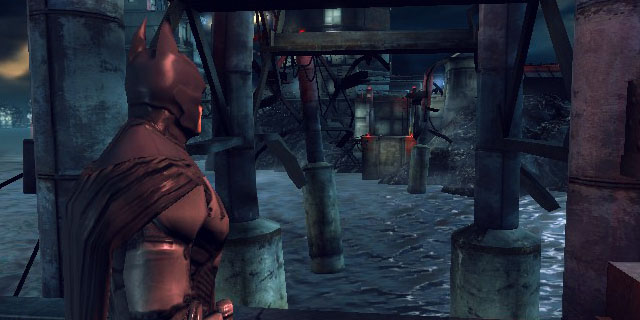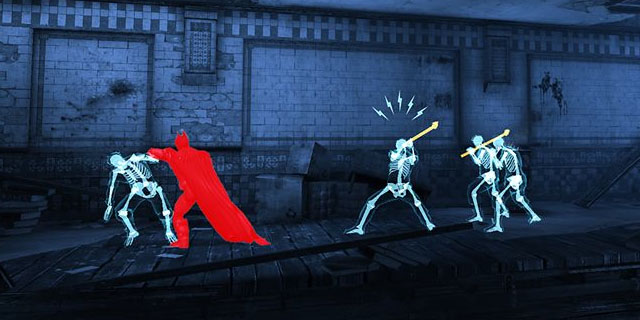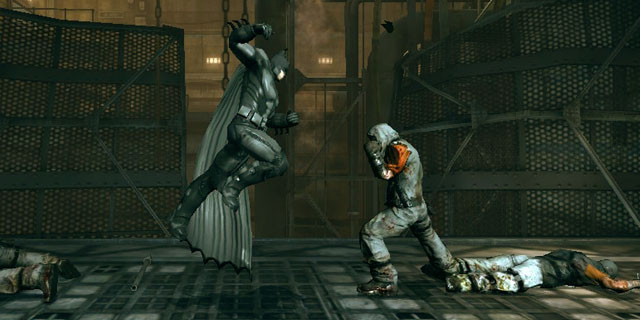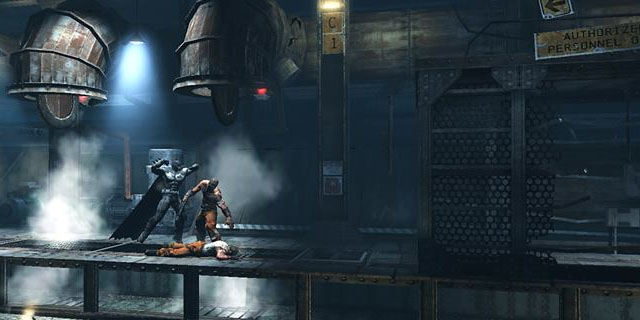
Batman: Arkham Asylum drew a lot of comparisons to Metroid when it released in 2009. Arkham City and Arkham Origins have been steadily moving away from that formula ever since, trading upgrade-driven exploration for open-world gameplay. Blackgate, however, channels the Metroid franchise quite a bit, which is unsurprising given developer Armature Studio’s ex-Retro origins.
Three months after the events of Arkham Origins, Batman finds himself in store for yet another long and terrible night. This time, at least, the inmates are still stuck in Blackgate Prison. The bad news is that they’ve taken over. Between Black Mask, The Penguin and The Joker, Batman will have plenty of thugs to engage. Blackgate Prison is split into three separate areas that can be tackled in whatever order you choose. Each main villain has holed up in his own portion of the prison, and you can count on each area unfolding in about the same way.

That’s not to say it isn’t fun, but a more streamlined experience would have allowed for better gadget use throughout the adventure. As it is, you can count on explosive gel only really being used in Black Mask’s Industrial area, where you pick it up from a WayneTech crate that really felt out of place in the middle of the prison. The same goes for upgrades found elsewhere. You can use them for progression there, and only there, because the possibility that I picked up the explosive gel hours before you is a very real one. What Armature did, though, is make the final area depend on what order you tackled the initial three areas. Most Metroid-inspired games lack replay value, but Blackgate has two additional playthroughs prepped and ready to go.
Combat is lifted straight from the console games, and it feels right at home on a portable. Fights in the Arkham series have always been more about strategy than instinct, so nothing is lost by scaling things down and losing the three-dimensional nature. You’re still countering, ground-pounding and cape-stunning thugs whenever they appear. There’s no experience to be gained from combat this time around, though, so the penalty for stumbling your way through a fight is gone. Finishing up with a sliver of health counts just as much as finishing without taking a scratch. I think that change is a good one.

Previous Arkham titles have moved squarely into brawler territory, and obtaining upgrades solely through exploration here feels much closer to the Arkham series’ roots in Nintendo’s Metroid games. What they didn’t successfully crib from the adventures of Samus Aran, however, is a competent map screen. Since Blackgate Prison is, ostensibly, a building that exists in three dimensions, the two-dimensional map doesn’t really work. A pull from Shadow Complex would have been welcome here. I know that Blackgate isn’t a 2D building just like I know that Zebes isn’t a 2D planet. Leave the background details in, but leave Batman to navigate horizontally only.
There are fewer predator sections in Blackgate than other Arkham titles, but that works to the game’s favor. Getting spotted in 3D and getting spotted in 2D are wildly-different problems. It’s nearly impossible to get away after being spotted here, because there are no grates or corners to hide in while you formulate a plan and significantly fewer perches available to sit on. The few encounters present are designed well and felt right, but I wasn’t aching for more opportunities or more enemies per encounter.

Story presentation is top-notch. Story beats are presented as motion comics fully-voiced by series mainstays, so you’ll be hearing Roger Craig Smith as Batman, Grey DeLisle as Catwoman and Troy Baker as the Joker. All sound great, and the comic-book aesthetic is beautiful and, unsurprisingly, looks like a Batman comic. Whether or not Armature went with this style due to technical limitations, it knocked it out of the park.
Batman: Arkham Origins Blackgate is exactly what you’d want out of a portable Batman game. Combat is pulled directly from its console brethren, and Blackgate feels the most reminiscent of Metroid yet. And the story, while technically a sequel to Origins, is standalone. Feel free to play them in whatever order you choose.
Pros: Solid combat, upgrades awarded through exploration, great comic and voice work
Cons: Map is hard to navigate, getting spotted is hugely punishing in predator segments



















